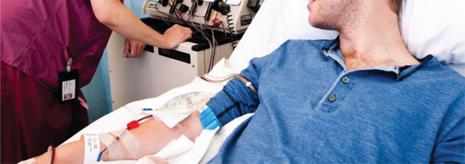People with a high Body Mass Index can make equally good stem cell donors as those with a healthy weight, according to new research by the British Bone Marrow Registry and Anthony Nolan.
Stem cell transplants are used in the treatment of blood cancers and disorders such as leukaemia. Two thirds of patients cannot find a matching donor in their family, so they rely on finding an unrelated donor through the recently aligned Anthony Nolan and NHS Stem Cell Registry
Study comes up with new findings
The research, "Stem Cell Donation by Donors with a High BMI: Is it Safe?" by Dr Annelies Billen, Medical Officer at Anthony Nolan and Dr Rachel Pawson, Consultant Haematologist at the British Bone Marrow Registry, will be presented to the world’s leading experts in stem cell research and treatment at the 10th International Donor Registry Conference at the Royal College of Physicians on Saturday.
In the past it was commonly thought that people with a high Body Mass Index (BMI) were more likely to experience side effects such as bone pain from donating their stem cells, and that it was harder to access the veins due to overlying fat.
Nineteen people with a BMI of over 35 were monitored for side effects for up to a year after they donated their stem cells, through a simple procedure called peripheral blood stem cell collection (PBSC), which is now used in the vast majority of stem cell donations.
The small study found that these donors experienced no more side effects than those people with a BMI of under 35. This showed that donating stem cells via PBSC which is similar to giving blood, can be undertaken safely and successfully by people with a BMI of between 35-40.
More donors can now join
Anthony Nolan and BBMR relaxed their joining policies around 18 months ago to allow people with a BMI of 40 or less to donate via PBSC. Previously, both registries had not accepted donors with a BMI of 35 or above.
This decision was made as the organisations found that having a high BMI was one of the main medical reasons why donors were not allowed to proceed to donation, despite limited evidence in the literature that these donors experience more adverse reactions.
Registries in USA, Canada and Germany have relaxed their policies to allow donors with BMIs of up to 40 in recent years, and have not reported any significant problems.
Further backing for policy change
Dr Rachel Pawson who is presenting the research said, ‘This new research adds further backing for our recent policy change and indicates that it could have a positive impact on the lives of people with blood cancer in the future.’
Dr Annelies Billen, Medical Officer at Anthony Nolan said, ‘Currently, 9 out of 10 stem cell donations are given through the bloodstream, so it is very encouraging to see evidence that this method is safe for donors with a BMI of 35-40, although numbers in this study are small.
This knowledge will help us save more lives as it will help us widen the pool of potential donors on our registry. We would welcome further research to improve this evidence base and will continue to monitor this group of donors in the future.’
The WMDA conference
The 10th International Donor Registry Conference is being hosted by us, in our 40th anniversary year. Around 300 delegates will attend the event at London's prestigious Royal College of Physicians, from Wednesday 14 May to Saturday 17 May 2014.
We manage the single UK bone marrow register, which we search to find matching stem cell donors for blood cancer patients. This is known as the ‘Anthony Nolan & NHS Stem Cell Registry’, and is aligned between Anthony Nolan, the NHS British Bone Marrow Registry and the Welsh Bone Marrow Donor Registry.
These various UK bone marrow registers became fully aligned in September 2013; a partnership that offers the potential to save many more lives in the future by speeding up the search for donors.
For more information about stem cell donation, click here.
